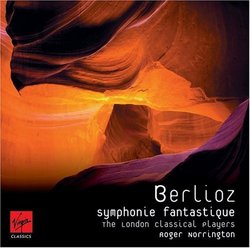| All Artists: Hector Berlioz, Roger Norrington, London Classical Players Title: Berlioz: Symphonie Fantastique - Roger Norrington, London Classical Members Wishing: 0 Total Copies: 0 Label: Virgin Classics Original Release Date: 1/1/2006 Re-Release Date: 9/12/2006 Genre: Classical Styles: Forms & Genres, Theatrical, Incidental & Program Music, Symphonies Number of Discs: 1 SwapaCD Credits: 1 UPC: 094636328621 |
Search - Hector Berlioz, Roger Norrington, London Classical Players :: Berlioz: Symphonie Fantastique - Roger Norrington, London Classical
 | Hector Berlioz, Roger Norrington, London Classical Players Berlioz: Symphonie Fantastique - Roger Norrington, London Classical Genre: Classical
|
Larger Image |
CD Details |
CD ReviewsDifferent III Samuel Stephens | TN, USA | 09/25/2007 (5 out of 5 stars) "There are now several "period instruement" versions of this symphony, the most lauded being John Eliot Gardiner's. While that version is interesting, it fails to be enjoyable. Now consider this Norrington recording, who sets out to do more or less the same that Gardiner (later) did. The last two movements are the most "different" that I have ever heard, in my experience with this symphony so far. His tempos are more deliberate, and he doesn't give you the "crash crash" that Michael Tilson Thomas does, or Beecham. This is a more measured reading...like Boulez's, with less opulence. I wouldn't recommend this as a first pick (go with the classic recommendations: Munch, Davis), but if you find yourself wanting to hear a very interesting reading indeed, this is what you should get." Invigorating David Saemann | 11/16/2008 (5 out of 5 stars) "This is a notable recording of the Symphonie Fantastique. The dynamic range of the recording is quite wide, forcing you to set the volume loudly to get the full impact of the performance. When that is done, the sound engineering is excellent. Norrington has gone to great lengths to achieve authenticity. Not only are the 1st and 2nd violins divided, but the whole orchestra is arranged in the studio according to the seating plan of the Paris Conservatoire Orchestra at the time of the premiere. Period timpani are definitely an advantage, with a stronger sound. Norrington even makes the point that one of the wind instruments was made by the man who probably played it in the premiere. The period brass have a range of sounds that adds to the orchestral color. As for Norrington's interpretation, it is very middle of the road. He takes the repeats in the 1st movement and the March, where his tempo is a walking march. The bells in the finale are the eeriest I've ever heard. Tempos throughout the work are steady, with the exception of the Witches' Sabbath coda, which is speeded up. The orchestra plays brilliantly. I'm not sure this is the only performance you ever will want to hear, but it is a refreshing take on the score."
|

 Track Listings (6) - Disc #1
Track Listings (6) - Disc #1